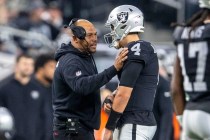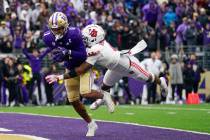Special Olympics fighting for funds
The motto is about being brave in the attempt. In the act of trying. They welcome you to be a fan of opportunity, of respect, of hope, of joy, of courage, of achievement, of inclusion.
The lagging economy has hit most everyone and everywhere at some level. Doors have been locked, jobs have been lost, and good causes have nearly starved to death for support.
You can count the Special Olympics among the last.
Which is a shame.
It has been a rough two years for the organization that provides those with intellectual disabilities countless fields of competition on which to perform. It has been a difficult time for those who believe in things such as dignity and equality for all people.
For those with hearts the size of mountains.
You can't watch a Special Olympics event and not be moved. Not if you own a shred of compassion and spirit. Not if you believe in the power of a world where every person can be celebrated and accepted in sport.
Here's a big misconception about the Special Olympics: That because it is defined by its founder, the late Eunice Kennedy Shriver, and because its headquarters are based in Washington, D.C., and because it features more than 3 million athletes in more than 150 countries, that state organizations somehow all fall under the same umbrella of federal support.
The perception couldn't be more false.
Local affiliates are entirely self-supporting, and as the economy has taken its nosedive to the ocean's floor so too has much of what many once donated to the Special Olympics.
As funds dry up in such statutes as the Sport and Empowerment Act, the organization that for years has torn down barriers and helped the disabled conquer prejudice searches for new avenues of help.
The ironic part: As funding decreases locally, the number of participants grows daily.
"It has been a devastating last two years," said Maggie Schwarz, regional director of Special Olympics Nevada, which is based in Las Vegas. "As the sponsorship dollars have gone away, we have finally gotten the message out to our athletes about participating. We added 131 in Las Vegas alone last year.
"A ballpark figure would be that we cut expenses by a third, and that's not to say we ever train and compete at extravagant ways to begin with. We have eliminated sports. But there are travel costs for competitions and uniforms and everything else it takes to offer what we do for nearly 4,000 athletes in nine sports."
Which brings us to another misconception about the Special Olympics: That competitions are held just once every two years, alternating between the Summer and Winter Games. In fact, leagues and games and specialized programs at the state level take place year-round, including one subsidized by the Clark County School District that allows those with intellectual disabilities to compete against nondisabled children.
In Nevada, it costs $250 per athlete per Special Olympics sport. Most athletes compete in at least two. That's $500 per athlete. Multiply that by nearly 4,000.
That's a lot of zeros to discover through fundraising and, well, at times begging.
Sue Davis is soon headed to Washington for a fifth time. She will appear on Capitol Hill with her daughter, Cari, to make the state's representatives aware of what is happening with Special Olympics Nevada.
Cari Davis is 33 and suffers from cerebral palsy, a group of permanent disorders of development of movement and posture. Cari participates in basketball, bowling and track and field, activities that can lessen the chance her muscles will spasm.
That's just the beginning.
"The (Special Olympics) are a way for those athletes to earn respect, to show they can compete on playing fields, to allow them not only an outlet with the athletic side of life but also the social side," Sue Davis said. "To show that they can do anything a regular, normal person -- I hate those terms -- can do.
"We know times are tough out there for everyone. We understand how hard things are right now."
But they forge ahead. They seek volunteers. They turn no athlete away. They remain determined in continuing to tear down those barriers and crush stigmas and end isolation.
They continue to fight for a very worthy cause.
One that is about so much more than sport.
------
A general volunteer orientation for Special Olympics Nevada is scheduled for Jan. 26 at 6 p.m. inside the conference room at The Orleans bowling center. For more information, call 702-474-0690.
Las Vegas Review-Journal sports columnist Ed Graney can be reached at egraney@reviewjournal.com or 702-383-4618. He also can be heard weeknights from 11 p.m. to 1 a.m. on "The Sports Scribes" on KDWN-AM (720) and www.kdwn.com.

















